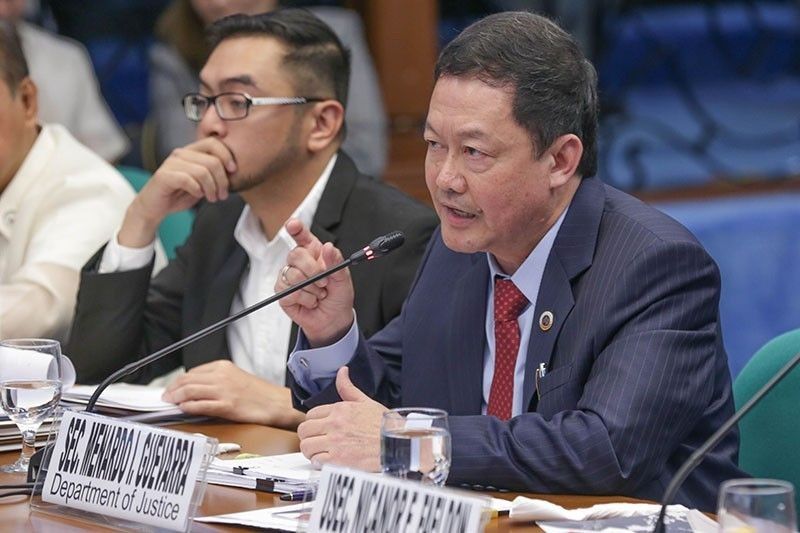DOJ gains access to 61 'drug war' admin cases, but watchdog hits 'too slow' development

MANILA, Philippines — Nearly five years into President Rodrigo Duterte's "war on drugs", the Department of Justice has gained access to 61 administrative cases that the police's Internal Affairs Service is handling.
"The PNP will allow the DOJ access to records of 61 cases (involving hundreds of [Philippine National Police] personnel nationwide) where the PNP Internal Affairs Service had found administrative/criminal liability on the part of law enforcement agents," Guevarra told reporters on Monday.
The period covered by the 61 incidents remains unclear, he also said. The cases are also outside the drug war review the DOJ is heading, but Guevarra pointed out that the IAS found clear liability on the part of state agents.
"We will know all these once we see the actual records. What is significant right now is that the DOJ has been given free access, something that did not happen in previous years, thereby making our review rather difficult," he added.
“The DOJ and the PNP will execute a formal memorandum to embody this agreement,” Guevarra also said.
This development came after Guevarra and newly-appointed police chief, Gen. Guillermo Eleazar met on May 21 and discussed active collaboration in the review of illegal drug operations where deaths occurred, and in the investigation of alleged EJK and related cases.
The meeting came weeks after Eleazar took the reins of PNP leadership and three months after Guevarra told the United Nations Human Rights Council that, in the DOJ-led “drug war” review, police failed to follow protocols in many anti-drug operations.
Too small a number, too slow
But Human Rights Watch Senior Philippines Researcher Carlos Conde pointed out that these 61 cases are a "woefully paltry number considering that more than 7,000 killings by the police have been officially recorded."
"Instead of spinning this as moving the needle for accountability, he should convince his president to crack the whip on the police to force it to be more forthcoming and to be more serious about accountability. By Guevarra’s own admission now and in previous statements, there is basis to hold the PNP accountable," Conde also said.
He also pointed out that while gaining access to the 61 cases may be considered progress, the DOJ review is still slow and the PNP's apparent unwillingness to cooperate only show "the tokenism" at play since Guevarra promised before the UNHRC to review the "drug war" cases that resulted in deaths.
The "drug war" review panel figured significantly in the UNHRC’s resolution released in October that pushed for capacity building to improve the human rights situation in the Philippines, but stopped short in launching an independent, on-the-ground investigation, which rights groups have been calling for.
Conde continued: "There’s no urgency at all in the government’s response, even as the 'drug war' killings continue to occur on a regular basis. The council should now see what’s happening for what it is: an effort to mislead the international community about the horrific rights situation in the Philippines."
Where are the complaints?
The 61 cases, which the department can now access, are cases external to the DOJ-led review but will now be integrated with it, Guevarra said. He explained that they will examine “which administrative cases may also be ripe for possible criminal investigation.”
Guevarra said that in some of the deadly “drug war” cases, criminal complaints have already been filed by parties of the victims. But he admitted: “Save in a few occasional cases, the biggest challenge to the criminal investigation/prosecution process is, and has always been, the willingness of witnesses to appear and testify.”
Since Guevarra’s statement before the UNHRC, the DOJ has given the PNP time to respond to the initial report where they found that “in more than half of the records reviewed, the law enforcement agents involved failed to follow standard protocols.”
The DOJ chief said in his meeting with the new PNP chief, “Eleazar expressed his sincere intention to cooperate with the DOJ in order to remove or discipline wrongdoers among the ranks of the police and thereby uplift the image of the PNP as protectors of the people.”
Guevarra also noted the decision of the PNP chief to give access to the PNP as a “significant milestone to exact accountability” and assured that the DOJ will support the PNP’s move to clean its ranks.
UN special rapporteur Agnes Callamard however said in January that the DOJ-led “drug war” review must go beyond the police officers who killed but also those who emboldened them to do so.
The benchmark for exacting accountability for killings and human rights violations in the country must also also go beyond dismissing cops found to have committed them, she said then.
- Latest
- Trending



























